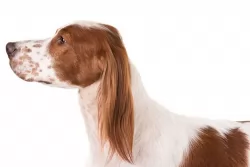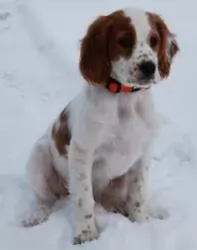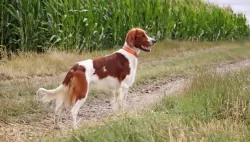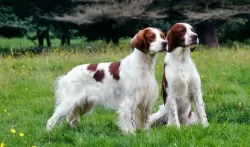 MyDogBreeds
MyDogBreedsIrish Red and White Setter is originated from Ireland but Australian Cattle Dog is originated from Australia. Irish Red and White Setter may grow 11 cm / 5 inches higher than Australian Cattle Dog. Irish Red and White Setter may weigh 18 kg / 40 pounds more than Australian Cattle Dog. Both Irish Red and White Setter and Australian Cattle Dog has almost same life span. Irish Red and White Setter may have more litter size than Australian Cattle Dog. Irish Red and White Setter requires Moderate maintenance. But Australian Cattle Dog requires Low maintenance
 Classified as a gun dog in the UK for hunting game birds, and as a sporting dog in the USA, the Irish Red and White Setter was available with his red and white coat. Breeders however, started focusing essentially on the red variety so that the red-and-white setter all but disappeared.
Classified as a gun dog in the UK for hunting game birds, and as a sporting dog in the USA, the Irish Red and White Setter was available with his red and white coat. Breeders however, started focusing essentially on the red variety so that the red-and-white setter all but disappeared.
Fortunately, the breed was revived and considered a separate breed from the Irish Setter. He has gained recognition with all the major kennel clubs.
During the 19th century, in the New South Wales, lived a cattle farmer Thomas Hall. He wanted to have a perfect cattle dog so he mixed two breeds: dogs used by stockman with the dingo. The new breed was given an interesting name - Halls Heelers. Heelers was a part of the dog breed because this new breed of the dog inherited the nipping instinct. As time passed, one breed was developing in two breeds: the Australian Cattle Dog and the Australian Stumpy Tail Cattle Dog.
The Australian Cattle dog can be found in two available colours: red and blue. This is how they got their nicknames: Red Heeler and Blue Heeler.
 The Irish Red and White Setter is a large dog standing at between 56 – 61cm, both male and female, and weighing at around 25 to 34kg.
The Irish Red and White Setter is a large dog standing at between 56 – 61cm, both male and female, and weighing at around 25 to 34kg.
Always used as a gun dog for its speed and scent, its head is carried high and its long feathery tail is held out level with its back and then it ‘sets’ into a pose, giving its handler a clue where the bird is hiding.
The Irish Red and White Setter has a lean, muscled body which is well proportioned, being slightly more heavily built than the Irish Setter. He also has a broader head.
The coat is shortish but it has those long silky fringes which are known as feathering around the tail, chest and legs. The Irish Red and White Setter is red and white but you may find some freckling around the legs and muzzle. The ears are usually red and they are long, silky and floppy.
As gun dogs, the Irish Red and White Setter is a loyal and devoted family pet who can become a good friend of children too as they love to play. He is a lithe dog and bounding in energy, and he will therefore require a reasonably sized garden.
He will need to be trained and socialized and once trained he makes an obedient and reliable companion.
The Australian Cattle Dog originally mixed with Australian herding dog that was kept near the cattle to guide them. Medium-sized, with the short coat, this dog is generally easy to groom and maintain. It does require more brushing during the shedding period, but it is still not an everyday need. He is easy to train because he likes challenging games and activities which are. It gets very attached to its owner, and he is always protective of them and their possessions. The most common health problems happen with their ears and eyes, but they are usually very healthy and they have a long life – up to 15 years.
 The Irish Red and White Setter is every bit as beautiful as the Red- or Irish Setter even though he may not be as well known.
The Irish Red and White Setter is every bit as beautiful as the Red- or Irish Setter even though he may not be as well known.
Setter lovers are thrilled that this beautiful, playful, well tempered dog has been saved from extinction. He has plenty of stamina to be an excellent sporting dog.
He is intelligent too and easily trained. He is an affectionate, loyal, gentle, devoted family dog and he has also got good looks on his side.
Give him the right kind of food, a warm, dry place to sleep, lots of exercise and games and your love and attention, and you’ve got a friend for life.
Children and Australian Cattle Dogs can grow up together in harmony. They will have a loyal and protective companion. After you properly train your dog and teach your child how to play with the dog, you will bring the friendship on the safe side. Some of them will have the instinct to nip at heels, so you should pay attention to this while training your pet.
Special talents: cattle dog, service dog, therapy dog, police dogs, drug detection dogs.
Australian Cattle Dogs can survive cool, hot and temperate conditions. They can live in a shelter outdoors, and they do well living indoors. But, be aware – without enough physical activity, this dog will end up being frustrated and unhappy.
They will absorb every new trick so quick that you will be amazed. They love to learn, and if you start with some good trick you will raise a great friend and maybe a great competitor in fetch, swim, bring-a-stick, or run-the-show dog sports.
 Dogs like the Setter can get chronic allergies if they’re exposed to the same food over and over again. Setters are prone to chronic allergies when exposed to a food such as soy. That is why if you’re unsure, rather speak to a dog expert about what to feed a Setter and what to avoid.
Dogs like the Setter can get chronic allergies if they’re exposed to the same food over and over again. Setters are prone to chronic allergies when exposed to a food such as soy. That is why if you’re unsure, rather speak to a dog expert about what to feed a Setter and what to avoid.
Feed your Setter foods rich in taurine to avoid heart disease. Taurine is found in chicken and red meat. You can see how important the right food is for your setter as the wrong food can cause a host of illnesses.
Health Problems: are mostly inherited. You can avoid this by searching for a good breeder that can clear out the hereditary diseases.
The Australian Cattle Dog is one of the breeds that can be born with progressive retinal atrophy. Progressive rod-cone degeneration is a disease that causes the rods and cones in the retina of the eye to degenerate. It might lead to blindness.
The Australian Cattle Dog is one of the rare breeds with recessive piebald alleles. This gene is the reason why they have white colour on their coat. But, unfortunately, this gene can be the reason why congenital hereditary deafness develops.
 Grooming your beautiful Irish Red and White Setter isn’t going to be a difficult task, and a good brush twice a week will ensure he stays looking his best.
Grooming your beautiful Irish Red and White Setter isn’t going to be a difficult task, and a good brush twice a week will ensure he stays looking his best.
Because he has long ears, these should be checked, especially if the dog loves to swim. Water, dust, debris and wax can build up and cause an ear infection.
His nails will also need to be trimmed if they get too long and don’t naturally wear down.
This is a beautiful dog that offers ruggedness and endurance, and essentially he needs to be a country dog or live in a home where there is a good sized garden. He loves being on the go, and is a dog that will gladly join you on your hikes, cycling trips or swimming – you can count him in.
Irish Red and White Setters are an active breed and are naturally lean and lithe, being fast runners. Make sure to give them the right food so that they maintain this muscle mass.
If in any doubt, speak to your vet to find out what is essential for a dog like this. Protein for instance is vitally important as are fats. These dogs need high amounts of energy. Vitamins and minerals are also very important for keeping a dog healthy and strong.
Try and include some nutritious home-made food into his kibble such as cooked chicken, brown rice and vegetables as well as some raw meat occasionally. These dogs can develop horrible skin allergies if they don’t get in some raw meat from time to time.
Fresh, cool water should be constantly available to your pet.
Herding dog have a history of the joint diseases. That’s why some of the pet suggest feeding a herding dog with meat like chicken, turkey, beef, lamb and fish. Dry dog food, even premium quality, may not be enough for this energetic dogs and their bone structure. But it depends on the dog. The best advice is to always take an advice from your breeder or your wet.
You won’t be very busy with grooming your Australian cattle dog. You don’t have to take everyday care of it. Occasional brushing will be more than enough. Bath the dog only when you notice odour problem.
The Australian Cattle Dog needs a high level of activity. Like many other herding dog breeds, they love walks, spending time with people, running or doing any athletic sports with them, teaching them tricks since they have above average intelligence. Fetching will be super fun for everyone, agility, competitions or any other challenging activity. They love water and they swim very well so you can take the dog with you to the nearest pool and have a great time.